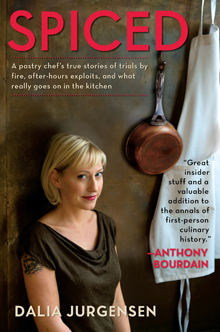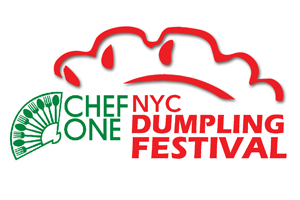
Last summer during one of my Red Cook Private Chinese Kitchen dinners, I accidentally let a metal steamer run out of water and burnt a hole in its bottom. Dalia Jurgensen, who was then assisting me in the kitchen, told me that she’d done the same thing while cooking at Nobu. We giggled quietly to ourselves knowing that we’d probably never admit such an error to anyone outside the kitchen. I quickly took the steamer off the stove, cooled it under running water and tossed it in the trash. These private moments are the kind of things Dalia shares in her new book Spiced.
Dalia left a desk job in publishing to become a pastry chef. How she started out as a novice cook at Nobu, worked her way through Layla and La Cote Basque to become the pastry chef of Veritas is told with vivid details in her book. She illuminates not only the mundane incidents in the kitchen but also the professional and personal exploits of the staff, as well as the politics in the restaurant world. As you can imagine it’s much more racy than just burning a hole in a pot.
Dalia is now the pastry chef of Dressler in Brooklyn and I had a chance to interview her last month. I thought you would enjoy reading about how she came to embrace cooking as a profession and how she survived in a professional kitchen.
-
In your book you say that you’ve had the idea of working in the kitchen in the back of your mind since you were a small child. Can you tell us more about the part food and food preparation played in your early life?
Some of my earliest memories are cooking with my mother, standing on a chair next to her at the counter helping with preparations. She cooked a lot of Danish foods (she and my father moved to the U.S. in the 60’s) and often baked fresh bread, always using miscellaneous leftovers like rice or oatmeal. Though she didn’t make especially fancy meals, she always took great care to make things correctly—and delicious.
-
Your book has been called racy and revealing, how did you draw the line and decide what to include and what to omit in your book?
I didn’t really worry about whether or not I was revealing too much or too little — I simply tried to tell the story. I did try to limit my stories to things that were relative to my life in a restaurant, and to that story. It’s funny, I never felt that my life was so racy!
-
Is there any anecdote, story or piece of information that you couldn’t find a place for in your book that you’d like to share?
I do feel that the best of the anecdotes made it into the book. My husband, on the other hand, wishes he had a bigger part in the book! But, since he is blessedly removed from the restaurant business, and our relationship didn’t overlap that much with the time period covered in the book, he didn’t make the cut.
-
In your book you described falling into a pastry chef position unintentionally. Now you’re an author. Was it intentional? How did you identify the opportunities that got you where you are?
I’ve always wanted to write but I didn’t start focusing on writing until I became a pastry chef. I enrolled in a non-fiction writing class at The New School just to give it a go — I didn’t want to grow old and regret not having tried. I really enjoyed the class, and kept writing, eventually joining a writing workshop that was led by my teacher at The New School, and that is where I started taking writing more seriously and gave me more confidence. With this bit of confidence, I asked a published friend about his agent, and this agent eventually connected me with a different agent who was interested in my restaurant writing. It was with her that I really got serious about the idea of a memoir about being a pastry chef. So I guess that my “success” as a writer was much like my success as a pastry chef, a series of lucky opportunities, along with a fair amount of determination.
-
You mostly worked as pastry chef in restaurants. Do you have a strong desire to get more involved in other parts of the kitchen?
I still love the other parts of the kitchen — savory cooking, butchering, even simple prepping, but I can do all of those things at home, and enjoy them just as much. It’s one of the nice things about cooking.
-
It’s generally accepted that people will have three or more careers in their lifetime. What were some of the things you learned in corporate America that helped you succeed in the restaurant business?
Honestly, I’m not sure that I learned all that much from corporate America, other than that it wasn’t for me! And, I was so, so young—I hardly understood the machine and what part I could play in it. Working in restaurants, however, I think has prepared me for whatever new career paths I might go down.
-
Do you see any change in the future now that you’ve published Spiced? What’s next for you? Where do you see your life heading?
Hmmm… I’ve never been good at knowing what comes next. I hope that I’ll have more opportunities to write because of Spiced, and maybe more and different kinds of opportunities to make desserts. I would love to keep writing, keep cooking—maybe open my own bakery or start a line of cookies. I’d love to work in television. Who knows?!
-
You helped open many restaurants before as you described in the book. If you were to open your own restaurant how would you change the culture of the workplace to make it more supportive of the kitchen staff?
I think I would have the same strict rules in terms of maintaining quality and work ethic, but I’d love to offer my employees a better lifestyle overall: health insurance, paid vacations, things like that, so there’d be some tangible payoff for all the hard work I’d require to keep things up to a high standard. Restaurant employees will always work weekends and holidays, but it would be nice if we enjoyed a few of the “perks” that corporate and union jobs offer.
-
You’re currently working as a pastry chef at Dressler in Brooklyn. Are there any stories from this restaurant you’d like to share?
As in any restaurant, Dressler has its share of characters, but none of the stories would fit here…
-
Is Danish pastry really Danish? Are you familiar with your native Danish cuisine? Tell us what your opinions of it?
The funny thing is that in Denmark, what we think of as Danish is called wienerbrød, or Viennese bread. I grew up eating down to earth Danish foods like frikedeller, hakkebof and biksemad and eating is definitely one of the highlights any time I visit my family there. The sausages and hot dogs are the best! and are, I think, best enjoyed walking along the shopping streets. My favorites are served with remolade, pickled cucumbers and fried onions. We also have some wild boar every time I go, along with roast pork that still has its skin, nice and crispy. The only thing I don’t love, and I’m teased mercilessly for it, is herring! I hate anything too fishy.






Thanks for posting this Kian. I’ve enjoyed reading My Spiced Life and am intrigued to get this book now that it is out. Might make for a fun August weekend read 🙂
This book is new to me. I will check it out. GREG